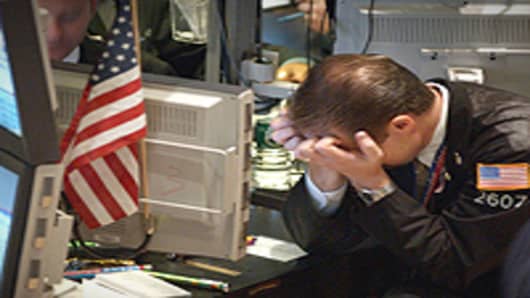The reason stocks may not move much higher is that investors are waiting to see what third-quarter earnings look like and whether the Federal Reserve will again cut interest rates. And both of those events won't happen until well into October.
"On a short-term basis looking out a week or two, I expect normal profit-taking will drive stocks," said Al Goldman, chief market strategist at A.G. Edwards. "We went up 6% in six days. We're more than entitled to a pause to refresh."
The Dow Jones Industrial Average rose more than 400 points in two straight sessions immediately following the Fed's surprise half-point cut in the federal funds rate this week. Stocks extended gains on Friday after a mild pullback the day before. The Dow and S&P 500 both ended the week up 2.8%
However, analysts aren't betting on another sharp, swift spike higher.
"Lightning Speed"
"The market reacted to the Fed action with lightning speed," said Frederic Dickson, chief market strategist at D.A. Davidson. "Most of the adjustment to the positive news happened in a New York second. I'm not expecting to see a whole lot more upward lift until we get past third-quarter earnings season next month."
Some analysts believe future Fed action may be the catalyst needed to keep stocks heading higher.
"Probably, yes, we need another rate cut to get the market moving," said Dickson. "But the Fed has put itself between a rock and a hard place. Inflationary pressures are building. Reality is setting in with gold and oil at record levels. We'll probably get another action or two from the Fed, but the penalty will be a weak dollar and higher import prices."
Next week, Wall Street will get more readings on the economy from new and existing home sales numbers, the final Gross Domestic Product report, as well as consumer confidence and durable goods orders data.
Sam Stovall, chief investment strategist for Standard & Poor's, says Wall Street will be looking for telltale signs about the health of the economy in the data and corporate earnings reports.
"Third-quarter earnings will be important, with people looking to see if we have a lot of write-downs," he said. "We'll also be looking for changes in the economic data and we'll see if we get a recovery in the employment data next month."
Economic Health
Goldman says the focus won't be so much on specific data as an overall impression that the economy will be alright.
"If investors assume that the risk of a recession has been reduced by Fed action, we need confidence the economy will sustain a soft landing and pick up in 2008," said Goldman. "I think there will be more cuts later this year because I think the data will show over the next few months that the economy could still use a boost, and the Fed has shown they are willing to be the cavalry and ride in to the rescue."
Liz Ann Sonders, chief investment strategist at Charles Schwab, isn't convinced a recession is out of the picture.
"I think the chances of a recession have gone up and writing it off is naive," she told CNBC.com. "I think housing is the primary problem. The worst news is ahead from the adjustable rate mortgage perspective and we have $80 a barrel oil. So there are pressures on the consumer."
Marc Pado, U.S. market strategist at Cantor Fitzgerald, is optimistic policymakers will aide the markets, if for no other reason than 2008 is an election year.
"I am very much into this whole political conspiracy thing," said Pado. "The Fed is going to be there for us and so will the administration and the Congress. They will make sure in an election year that GDP is growing, hopefully upwards of 3%, by the fourth quarter of 2008."
"Pockets of Opportunity"
Some analysts are encouraging long-term investors to use a lull in the market to shop for good buys.
"Look for pockets of opportunity," said Dickson. "Stick with large-cap companies with international exposure. I like major companies in technology and healthcare."
Stovall likes companies that do business overseas as well. "The greatest percentage of revenues for energy and technology companies comes from overseas," he said. "Tech has very limited exposure to any kind of subprime situation. If economic growth remains fairly strong internationally and lower interest rates hopefully propel growth here in the U.S., that should lead to a fairly tight energy supply environment."
Keith Wirtz, chief investment officer at Fifth Third Asset Management, believes stocks will finish higher from current levels.
"We're maintaining our price target of 1600 or better on the S&P 500," Wirtz told CNBC.com. "Most people have played away from financials and we think you have to move quickly back into financials."
"Invest, but have some cash on the sidelines thinking that the market is going to have a moderate pullback," said A.G. Edwards' Goldman. "The market is selling at 15 times projected earnings, so that's a reasonable valuation and we have very little irrational exuberance. I think the most interesting areas are the financials and technology."
Energy Good Bet
Mayer believes financial stocks will continue to struggle, but he thinks energy names will do well.
"Gravitate toward energy names that look cheap," he said. "The oil drillers have been down. They have great balance sheets with lots of cash. The long-term trend in drilling favors more rigs."
Mayer also likes stocks tied to agriculture. "This theme favors increased production because you have the rush for biofuels and then you also have prosperity in India and China causing people to eat more meat, which requires more grain for feed."
Sonders believes investors would be wise to re-examine their portfolios during turbulent times. "During periods of increased volatility, make sure the risk within your portfolio is consistent with the risk you are emotionally willing to take," she said.


